Ethical Issues in Social Media Usage within Healthcare Contexts
VerifiedAdded on 2023/06/05
|20
|4737
|258
Report
AI Summary
This report examines the ethical issues arising from the use of social media in healthcare, driven by the increasing accessibility of health information and the growing role of social media in patient care, research, and communication. It highlights challenges related to youth engagement, the evolving doctor-patient relationship, crowdsourcing in healthcare, and the integration of social media with electronic health records (EHRs). The report discusses the need for robust privacy measures, informed consent protocols, and professional guidelines to navigate these ethical complexities. It proposes a framework to address these issues, acknowledging its strengths and weaknesses, and offers recommendations for healthcare professionals and researchers to ensure responsible and ethical use of social media in healthcare contexts. The document is contributed by a student and available on Desklib, a platform providing study tools and resources.
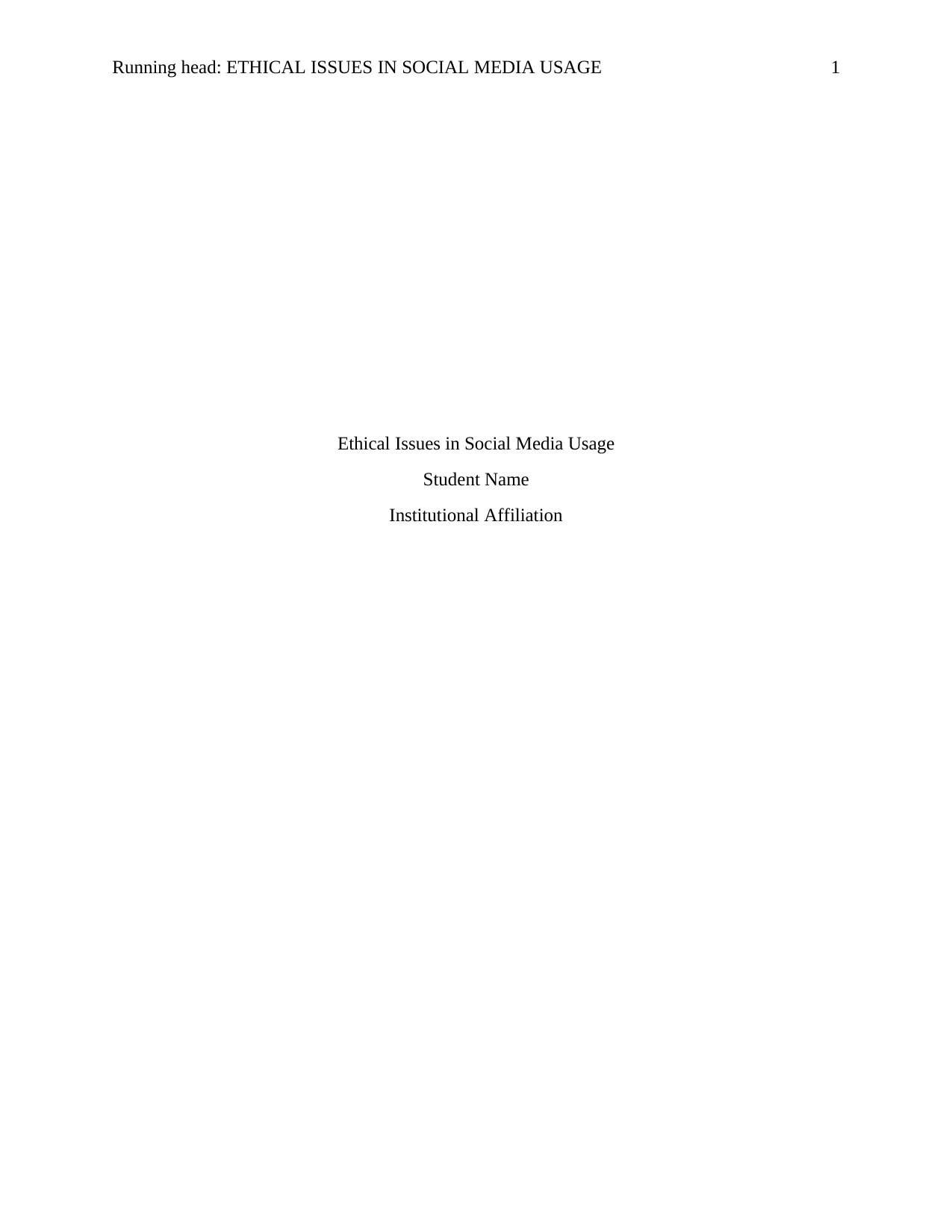
Running head: ETHICAL ISSUES IN SOCIAL MEDIA USAGE 1
Ethical Issues in Social Media Usage
Student Name
Institutional Affiliation
Ethical Issues in Social Media Usage
Student Name
Institutional Affiliation
Paraphrase This Document
Need a fresh take? Get an instant paraphrase of this document with our AI Paraphraser
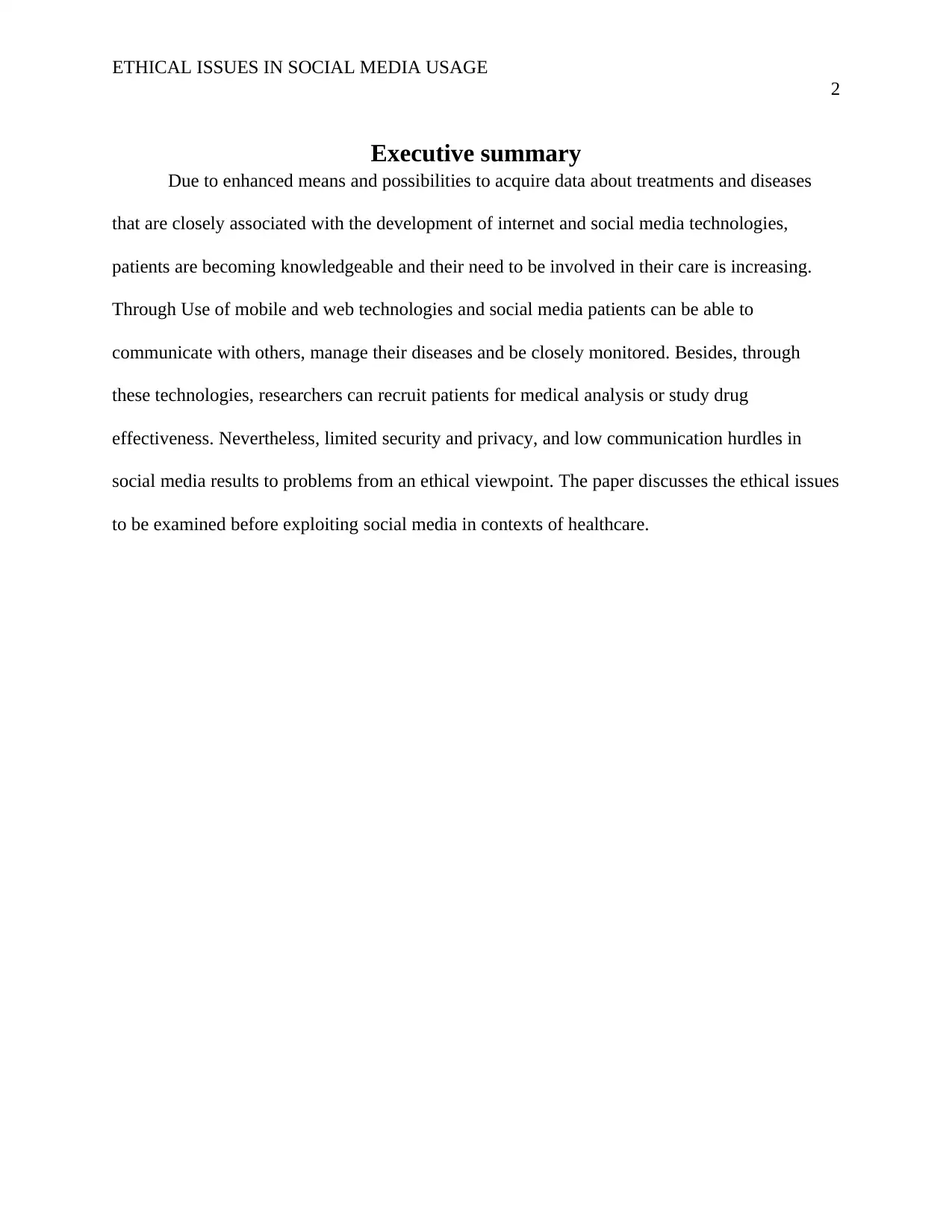
ETHICAL ISSUES IN SOCIAL MEDIA USAGE
2
Executive summary
Due to enhanced means and possibilities to acquire data about treatments and diseases
that are closely associated with the development of internet and social media technologies,
patients are becoming knowledgeable and their need to be involved in their care is increasing.
Through Use of mobile and web technologies and social media patients can be able to
communicate with others, manage their diseases and be closely monitored. Besides, through
these technologies, researchers can recruit patients for medical analysis or study drug
effectiveness. Nevertheless, limited security and privacy, and low communication hurdles in
social media results to problems from an ethical viewpoint. The paper discusses the ethical issues
to be examined before exploiting social media in contexts of healthcare.
2
Executive summary
Due to enhanced means and possibilities to acquire data about treatments and diseases
that are closely associated with the development of internet and social media technologies,
patients are becoming knowledgeable and their need to be involved in their care is increasing.
Through Use of mobile and web technologies and social media patients can be able to
communicate with others, manage their diseases and be closely monitored. Besides, through
these technologies, researchers can recruit patients for medical analysis or study drug
effectiveness. Nevertheless, limited security and privacy, and low communication hurdles in
social media results to problems from an ethical viewpoint. The paper discusses the ethical issues
to be examined before exploiting social media in contexts of healthcare.
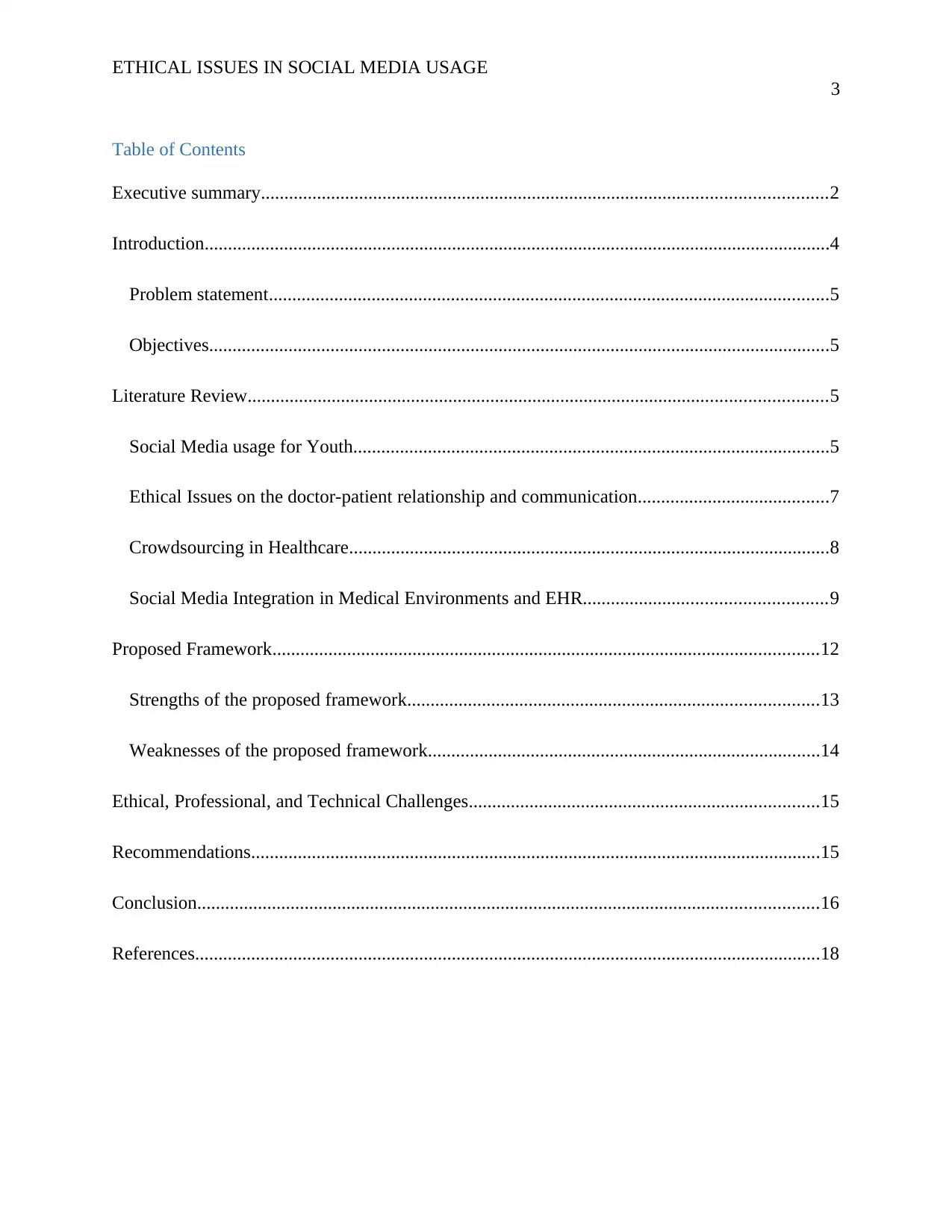
ETHICAL ISSUES IN SOCIAL MEDIA USAGE
3
Table of Contents
Executive summary.........................................................................................................................2
Introduction......................................................................................................................................4
Problem statement........................................................................................................................5
Objectives.....................................................................................................................................5
Literature Review............................................................................................................................5
Social Media usage for Youth......................................................................................................5
Ethical Issues on the doctor-patient relationship and communication.........................................7
Crowdsourcing in Healthcare.......................................................................................................8
Social Media Integration in Medical Environments and EHR....................................................9
Proposed Framework.....................................................................................................................12
Strengths of the proposed framework........................................................................................13
Weaknesses of the proposed framework....................................................................................14
Ethical, Professional, and Technical Challenges...........................................................................15
Recommendations..........................................................................................................................15
Conclusion.....................................................................................................................................16
References......................................................................................................................................18
3
Table of Contents
Executive summary.........................................................................................................................2
Introduction......................................................................................................................................4
Problem statement........................................................................................................................5
Objectives.....................................................................................................................................5
Literature Review............................................................................................................................5
Social Media usage for Youth......................................................................................................5
Ethical Issues on the doctor-patient relationship and communication.........................................7
Crowdsourcing in Healthcare.......................................................................................................8
Social Media Integration in Medical Environments and EHR....................................................9
Proposed Framework.....................................................................................................................12
Strengths of the proposed framework........................................................................................13
Weaknesses of the proposed framework....................................................................................14
Ethical, Professional, and Technical Challenges...........................................................................15
Recommendations..........................................................................................................................15
Conclusion.....................................................................................................................................16
References......................................................................................................................................18
⊘ This is a preview!⊘
Do you want full access?
Subscribe today to unlock all pages.

Trusted by 1+ million students worldwide
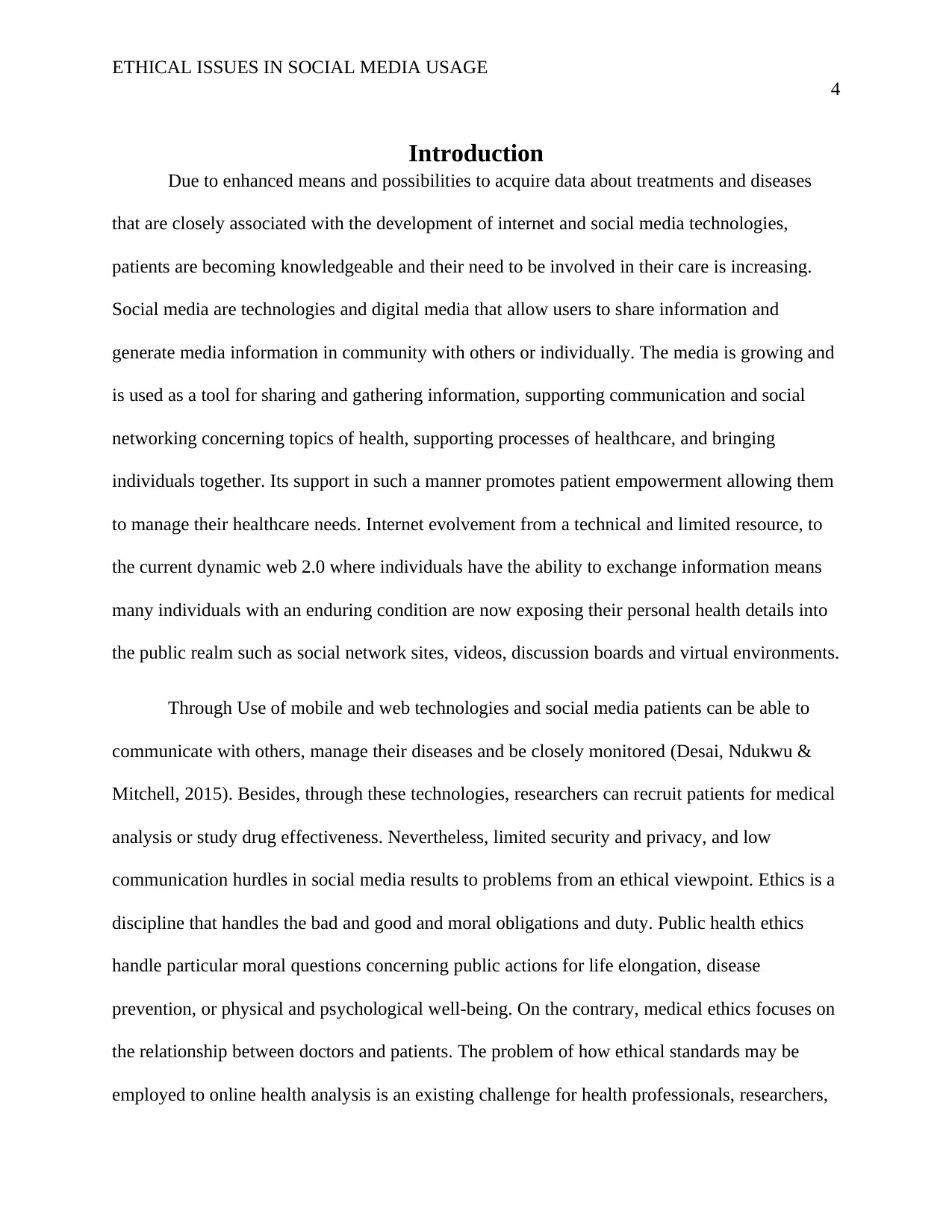
ETHICAL ISSUES IN SOCIAL MEDIA USAGE
4
Introduction
Due to enhanced means and possibilities to acquire data about treatments and diseases
that are closely associated with the development of internet and social media technologies,
patients are becoming knowledgeable and their need to be involved in their care is increasing.
Social media are technologies and digital media that allow users to share information and
generate media information in community with others or individually. The media is growing and
is used as a tool for sharing and gathering information, supporting communication and social
networking concerning topics of health, supporting processes of healthcare, and bringing
individuals together. Its support in such a manner promotes patient empowerment allowing them
to manage their healthcare needs. Internet evolvement from a technical and limited resource, to
the current dynamic web 2.0 where individuals have the ability to exchange information means
many individuals with an enduring condition are now exposing their personal health details into
the public realm such as social network sites, videos, discussion boards and virtual environments.
Through Use of mobile and web technologies and social media patients can be able to
communicate with others, manage their diseases and be closely monitored (Desai, Ndukwu &
Mitchell, 2015). Besides, through these technologies, researchers can recruit patients for medical
analysis or study drug effectiveness. Nevertheless, limited security and privacy, and low
communication hurdles in social media results to problems from an ethical viewpoint. Ethics is a
discipline that handles the bad and good and moral obligations and duty. Public health ethics
handle particular moral questions concerning public actions for life elongation, disease
prevention, or physical and psychological well-being. On the contrary, medical ethics focuses on
the relationship between doctors and patients. The problem of how ethical standards may be
employed to online health analysis is an existing challenge for health professionals, researchers,
4
Introduction
Due to enhanced means and possibilities to acquire data about treatments and diseases
that are closely associated with the development of internet and social media technologies,
patients are becoming knowledgeable and their need to be involved in their care is increasing.
Social media are technologies and digital media that allow users to share information and
generate media information in community with others or individually. The media is growing and
is used as a tool for sharing and gathering information, supporting communication and social
networking concerning topics of health, supporting processes of healthcare, and bringing
individuals together. Its support in such a manner promotes patient empowerment allowing them
to manage their healthcare needs. Internet evolvement from a technical and limited resource, to
the current dynamic web 2.0 where individuals have the ability to exchange information means
many individuals with an enduring condition are now exposing their personal health details into
the public realm such as social network sites, videos, discussion boards and virtual environments.
Through Use of mobile and web technologies and social media patients can be able to
communicate with others, manage their diseases and be closely monitored (Desai, Ndukwu &
Mitchell, 2015). Besides, through these technologies, researchers can recruit patients for medical
analysis or study drug effectiveness. Nevertheless, limited security and privacy, and low
communication hurdles in social media results to problems from an ethical viewpoint. Ethics is a
discipline that handles the bad and good and moral obligations and duty. Public health ethics
handle particular moral questions concerning public actions for life elongation, disease
prevention, or physical and psychological well-being. On the contrary, medical ethics focuses on
the relationship between doctors and patients. The problem of how ethical standards may be
employed to online health analysis is an existing challenge for health professionals, researchers,
Paraphrase This Document
Need a fresh take? Get an instant paraphrase of this document with our AI Paraphraser
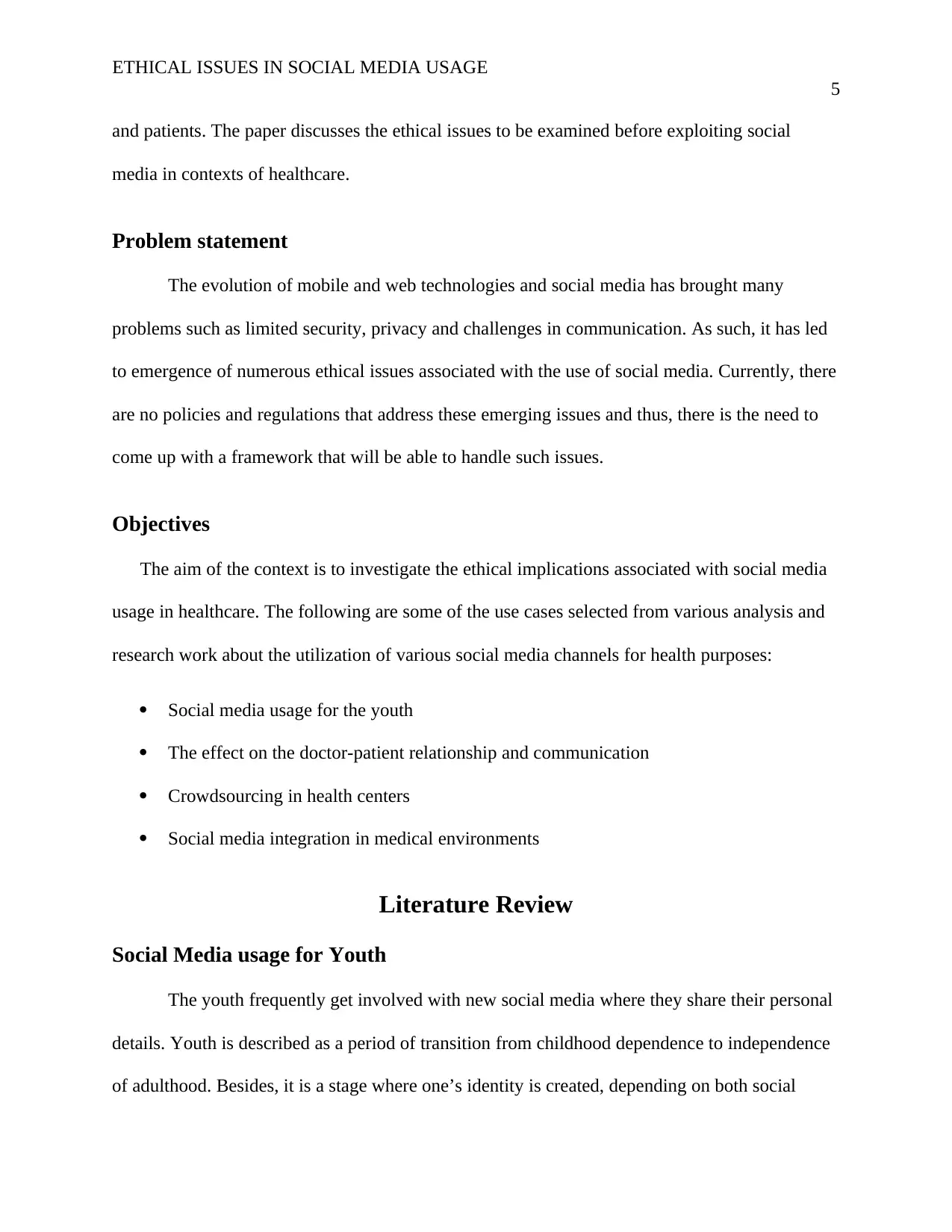
ETHICAL ISSUES IN SOCIAL MEDIA USAGE
5
and patients. The paper discusses the ethical issues to be examined before exploiting social
media in contexts of healthcare.
Problem statement
The evolution of mobile and web technologies and social media has brought many
problems such as limited security, privacy and challenges in communication. As such, it has led
to emergence of numerous ethical issues associated with the use of social media. Currently, there
are no policies and regulations that address these emerging issues and thus, there is the need to
come up with a framework that will be able to handle such issues.
Objectives
The aim of the context is to investigate the ethical implications associated with social media
usage in healthcare. The following are some of the use cases selected from various analysis and
research work about the utilization of various social media channels for health purposes:
Social media usage for the youth
The effect on the doctor-patient relationship and communication
Crowdsourcing in health centers
Social media integration in medical environments
Literature Review
Social Media usage for Youth
The youth frequently get involved with new social media where they share their personal
details. Youth is described as a period of transition from childhood dependence to independence
of adulthood. Besides, it is a stage where one’s identity is created, depending on both social
5
and patients. The paper discusses the ethical issues to be examined before exploiting social
media in contexts of healthcare.
Problem statement
The evolution of mobile and web technologies and social media has brought many
problems such as limited security, privacy and challenges in communication. As such, it has led
to emergence of numerous ethical issues associated with the use of social media. Currently, there
are no policies and regulations that address these emerging issues and thus, there is the need to
come up with a framework that will be able to handle such issues.
Objectives
The aim of the context is to investigate the ethical implications associated with social media
usage in healthcare. The following are some of the use cases selected from various analysis and
research work about the utilization of various social media channels for health purposes:
Social media usage for the youth
The effect on the doctor-patient relationship and communication
Crowdsourcing in health centers
Social media integration in medical environments
Literature Review
Social Media usage for Youth
The youth frequently get involved with new social media where they share their personal
details. Youth is described as a period of transition from childhood dependence to independence
of adulthood. Besides, it is a stage where one’s identity is created, depending on both social
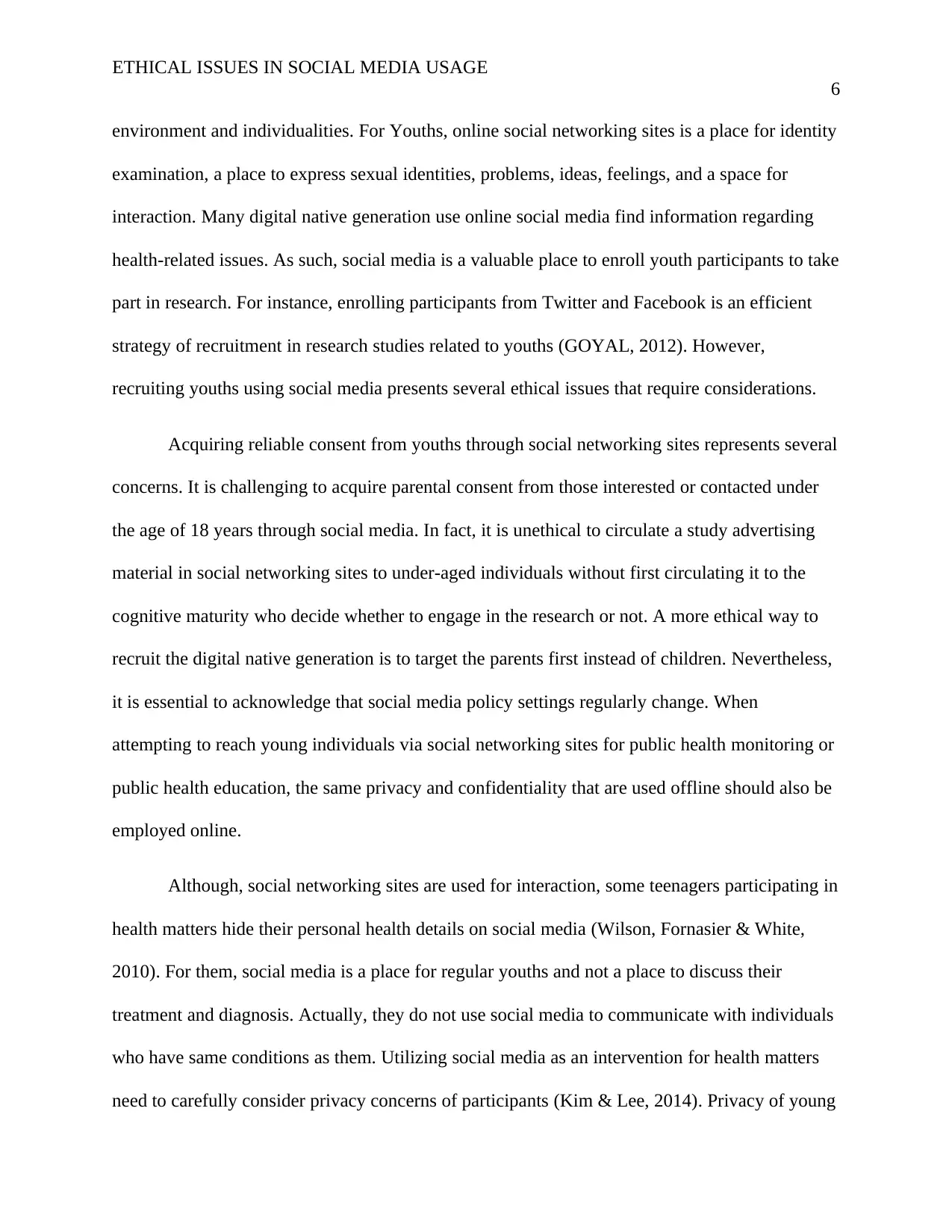
ETHICAL ISSUES IN SOCIAL MEDIA USAGE
6
environment and individualities. For Youths, online social networking sites is a place for identity
examination, a place to express sexual identities, problems, ideas, feelings, and a space for
interaction. Many digital native generation use online social media find information regarding
health-related issues. As such, social media is a valuable place to enroll youth participants to take
part in research. For instance, enrolling participants from Twitter and Facebook is an efficient
strategy of recruitment in research studies related to youths (GOYAL, 2012). However,
recruiting youths using social media presents several ethical issues that require considerations.
Acquiring reliable consent from youths through social networking sites represents several
concerns. It is challenging to acquire parental consent from those interested or contacted under
the age of 18 years through social media. In fact, it is unethical to circulate a study advertising
material in social networking sites to under-aged individuals without first circulating it to the
cognitive maturity who decide whether to engage in the research or not. A more ethical way to
recruit the digital native generation is to target the parents first instead of children. Nevertheless,
it is essential to acknowledge that social media policy settings regularly change. When
attempting to reach young individuals via social networking sites for public health monitoring or
public health education, the same privacy and confidentiality that are used offline should also be
employed online.
Although, social networking sites are used for interaction, some teenagers participating in
health matters hide their personal health details on social media (Wilson, Fornasier & White,
2010). For them, social media is a place for regular youths and not a place to discuss their
treatment and diagnosis. Actually, they do not use social media to communicate with individuals
who have same conditions as them. Utilizing social media as an intervention for health matters
need to carefully consider privacy concerns of participants (Kim & Lee, 2014). Privacy of young
6
environment and individualities. For Youths, online social networking sites is a place for identity
examination, a place to express sexual identities, problems, ideas, feelings, and a space for
interaction. Many digital native generation use online social media find information regarding
health-related issues. As such, social media is a valuable place to enroll youth participants to take
part in research. For instance, enrolling participants from Twitter and Facebook is an efficient
strategy of recruitment in research studies related to youths (GOYAL, 2012). However,
recruiting youths using social media presents several ethical issues that require considerations.
Acquiring reliable consent from youths through social networking sites represents several
concerns. It is challenging to acquire parental consent from those interested or contacted under
the age of 18 years through social media. In fact, it is unethical to circulate a study advertising
material in social networking sites to under-aged individuals without first circulating it to the
cognitive maturity who decide whether to engage in the research or not. A more ethical way to
recruit the digital native generation is to target the parents first instead of children. Nevertheless,
it is essential to acknowledge that social media policy settings regularly change. When
attempting to reach young individuals via social networking sites for public health monitoring or
public health education, the same privacy and confidentiality that are used offline should also be
employed online.
Although, social networking sites are used for interaction, some teenagers participating in
health matters hide their personal health details on social media (Wilson, Fornasier & White,
2010). For them, social media is a place for regular youths and not a place to discuss their
treatment and diagnosis. Actually, they do not use social media to communicate with individuals
who have same conditions as them. Utilizing social media as an intervention for health matters
need to carefully consider privacy concerns of participants (Kim & Lee, 2014). Privacy of young
⊘ This is a preview!⊘
Do you want full access?
Subscribe today to unlock all pages.

Trusted by 1+ million students worldwide
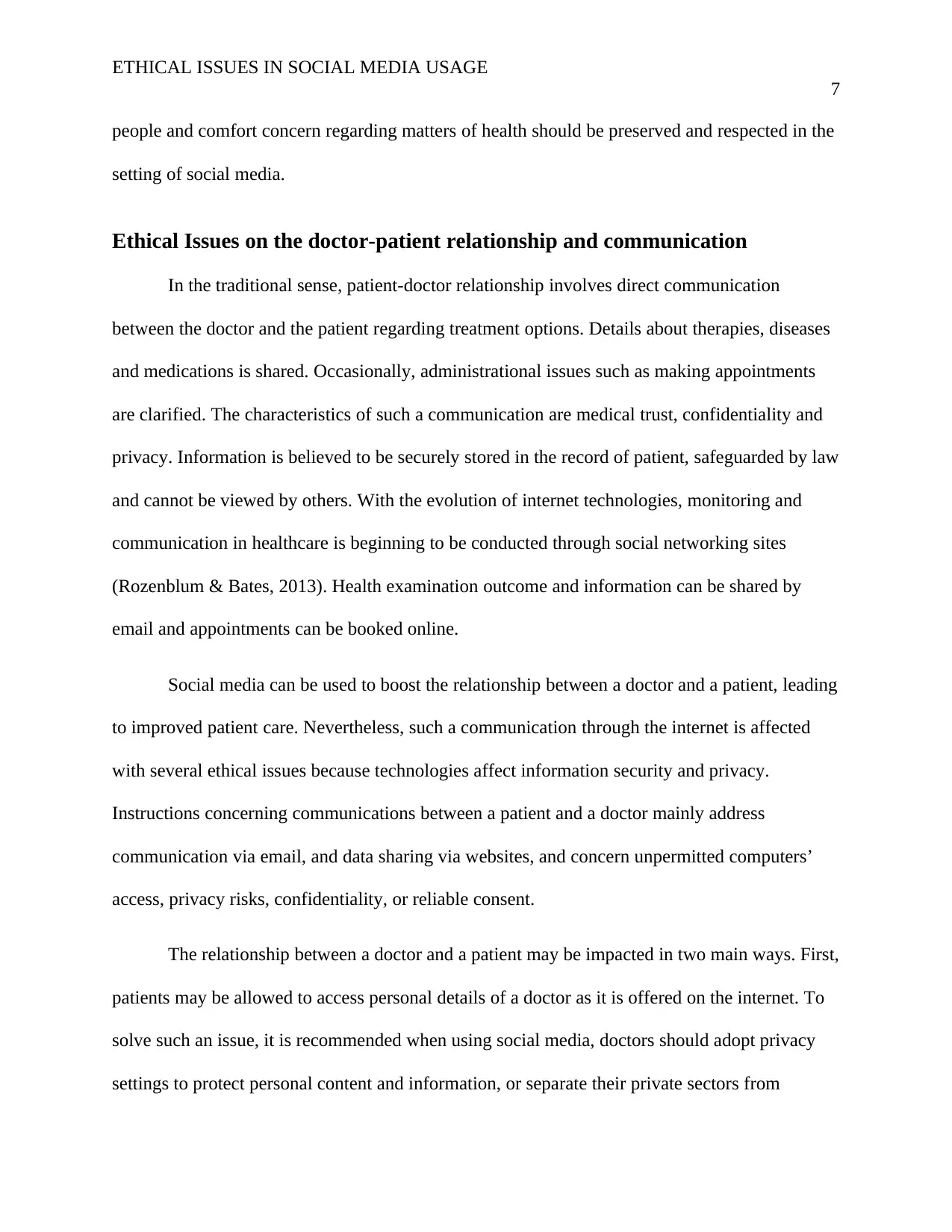
ETHICAL ISSUES IN SOCIAL MEDIA USAGE
7
people and comfort concern regarding matters of health should be preserved and respected in the
setting of social media.
Ethical Issues on the doctor-patient relationship and communication
In the traditional sense, patient-doctor relationship involves direct communication
between the doctor and the patient regarding treatment options. Details about therapies, diseases
and medications is shared. Occasionally, administrational issues such as making appointments
are clarified. The characteristics of such a communication are medical trust, confidentiality and
privacy. Information is believed to be securely stored in the record of patient, safeguarded by law
and cannot be viewed by others. With the evolution of internet technologies, monitoring and
communication in healthcare is beginning to be conducted through social networking sites
(Rozenblum & Bates, 2013). Health examination outcome and information can be shared by
email and appointments can be booked online.
Social media can be used to boost the relationship between a doctor and a patient, leading
to improved patient care. Nevertheless, such a communication through the internet is affected
with several ethical issues because technologies affect information security and privacy.
Instructions concerning communications between a patient and a doctor mainly address
communication via email, and data sharing via websites, and concern unpermitted computers’
access, privacy risks, confidentiality, or reliable consent.
The relationship between a doctor and a patient may be impacted in two main ways. First,
patients may be allowed to access personal details of a doctor as it is offered on the internet. To
solve such an issue, it is recommended when using social media, doctors should adopt privacy
settings to protect personal content and information, or separate their private sectors from
7
people and comfort concern regarding matters of health should be preserved and respected in the
setting of social media.
Ethical Issues on the doctor-patient relationship and communication
In the traditional sense, patient-doctor relationship involves direct communication
between the doctor and the patient regarding treatment options. Details about therapies, diseases
and medications is shared. Occasionally, administrational issues such as making appointments
are clarified. The characteristics of such a communication are medical trust, confidentiality and
privacy. Information is believed to be securely stored in the record of patient, safeguarded by law
and cannot be viewed by others. With the evolution of internet technologies, monitoring and
communication in healthcare is beginning to be conducted through social networking sites
(Rozenblum & Bates, 2013). Health examination outcome and information can be shared by
email and appointments can be booked online.
Social media can be used to boost the relationship between a doctor and a patient, leading
to improved patient care. Nevertheless, such a communication through the internet is affected
with several ethical issues because technologies affect information security and privacy.
Instructions concerning communications between a patient and a doctor mainly address
communication via email, and data sharing via websites, and concern unpermitted computers’
access, privacy risks, confidentiality, or reliable consent.
The relationship between a doctor and a patient may be impacted in two main ways. First,
patients may be allowed to access personal details of a doctor as it is offered on the internet. To
solve such an issue, it is recommended when using social media, doctors should adopt privacy
settings to protect personal content and information, or separate their private sectors from
Paraphrase This Document
Need a fresh take? Get an instant paraphrase of this document with our AI Paraphraser
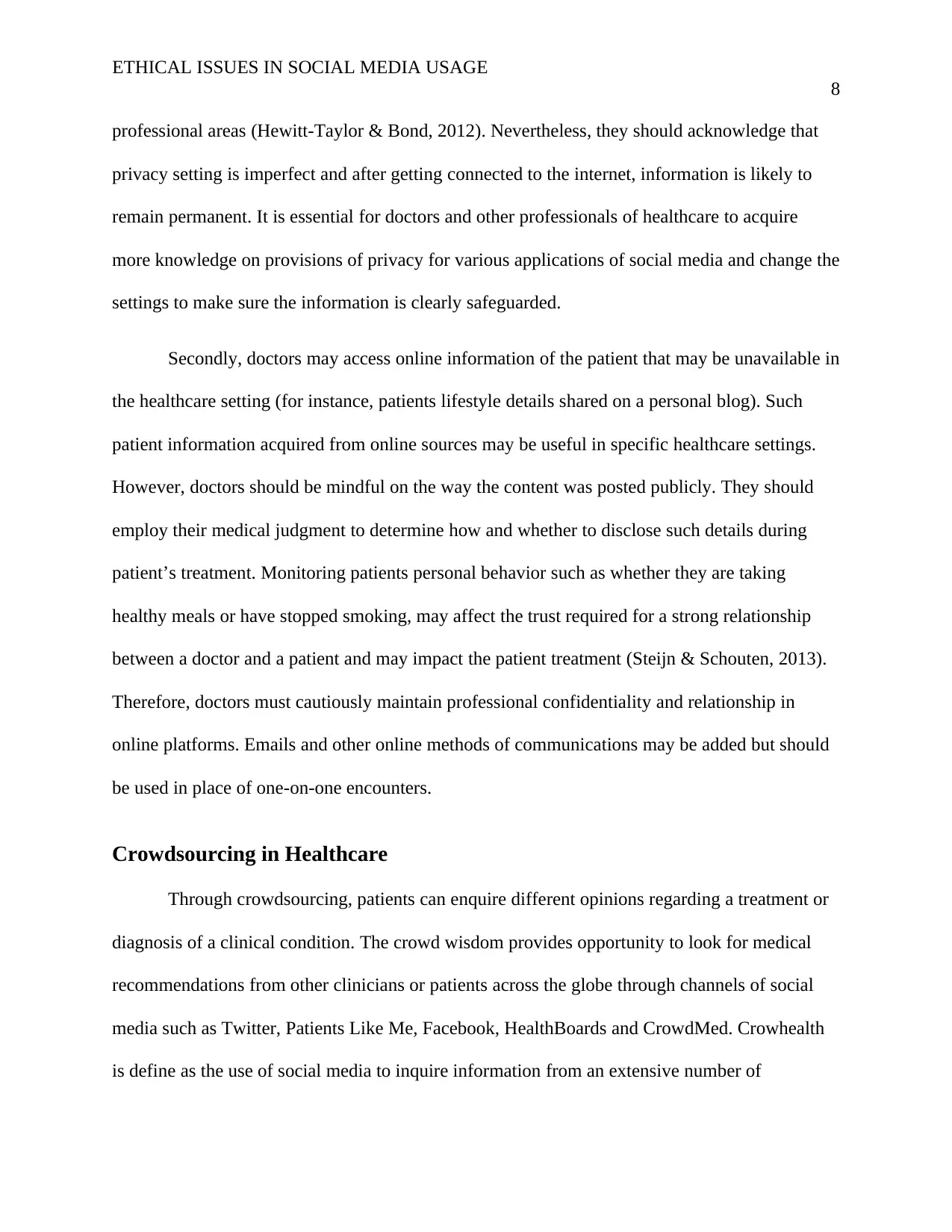
ETHICAL ISSUES IN SOCIAL MEDIA USAGE
8
professional areas (Hewitt-Taylor & Bond, 2012). Nevertheless, they should acknowledge that
privacy setting is imperfect and after getting connected to the internet, information is likely to
remain permanent. It is essential for doctors and other professionals of healthcare to acquire
more knowledge on provisions of privacy for various applications of social media and change the
settings to make sure the information is clearly safeguarded.
Secondly, doctors may access online information of the patient that may be unavailable in
the healthcare setting (for instance, patients lifestyle details shared on a personal blog). Such
patient information acquired from online sources may be useful in specific healthcare settings.
However, doctors should be mindful on the way the content was posted publicly. They should
employ their medical judgment to determine how and whether to disclose such details during
patient’s treatment. Monitoring patients personal behavior such as whether they are taking
healthy meals or have stopped smoking, may affect the trust required for a strong relationship
between a doctor and a patient and may impact the patient treatment (Steijn & Schouten, 2013).
Therefore, doctors must cautiously maintain professional confidentiality and relationship in
online platforms. Emails and other online methods of communications may be added but should
be used in place of one-on-one encounters.
Crowdsourcing in Healthcare
Through crowdsourcing, patients can enquire different opinions regarding a treatment or
diagnosis of a clinical condition. The crowd wisdom provides opportunity to look for medical
recommendations from other clinicians or patients across the globe through channels of social
media such as Twitter, Patients Like Me, Facebook, HealthBoards and CrowdMed. Crowhealth
is define as the use of social media to inquire information from an extensive number of
8
professional areas (Hewitt-Taylor & Bond, 2012). Nevertheless, they should acknowledge that
privacy setting is imperfect and after getting connected to the internet, information is likely to
remain permanent. It is essential for doctors and other professionals of healthcare to acquire
more knowledge on provisions of privacy for various applications of social media and change the
settings to make sure the information is clearly safeguarded.
Secondly, doctors may access online information of the patient that may be unavailable in
the healthcare setting (for instance, patients lifestyle details shared on a personal blog). Such
patient information acquired from online sources may be useful in specific healthcare settings.
However, doctors should be mindful on the way the content was posted publicly. They should
employ their medical judgment to determine how and whether to disclose such details during
patient’s treatment. Monitoring patients personal behavior such as whether they are taking
healthy meals or have stopped smoking, may affect the trust required for a strong relationship
between a doctor and a patient and may impact the patient treatment (Steijn & Schouten, 2013).
Therefore, doctors must cautiously maintain professional confidentiality and relationship in
online platforms. Emails and other online methods of communications may be added but should
be used in place of one-on-one encounters.
Crowdsourcing in Healthcare
Through crowdsourcing, patients can enquire different opinions regarding a treatment or
diagnosis of a clinical condition. The crowd wisdom provides opportunity to look for medical
recommendations from other clinicians or patients across the globe through channels of social
media such as Twitter, Patients Like Me, Facebook, HealthBoards and CrowdMed. Crowhealth
is define as the use of social media to inquire information from an extensive number of
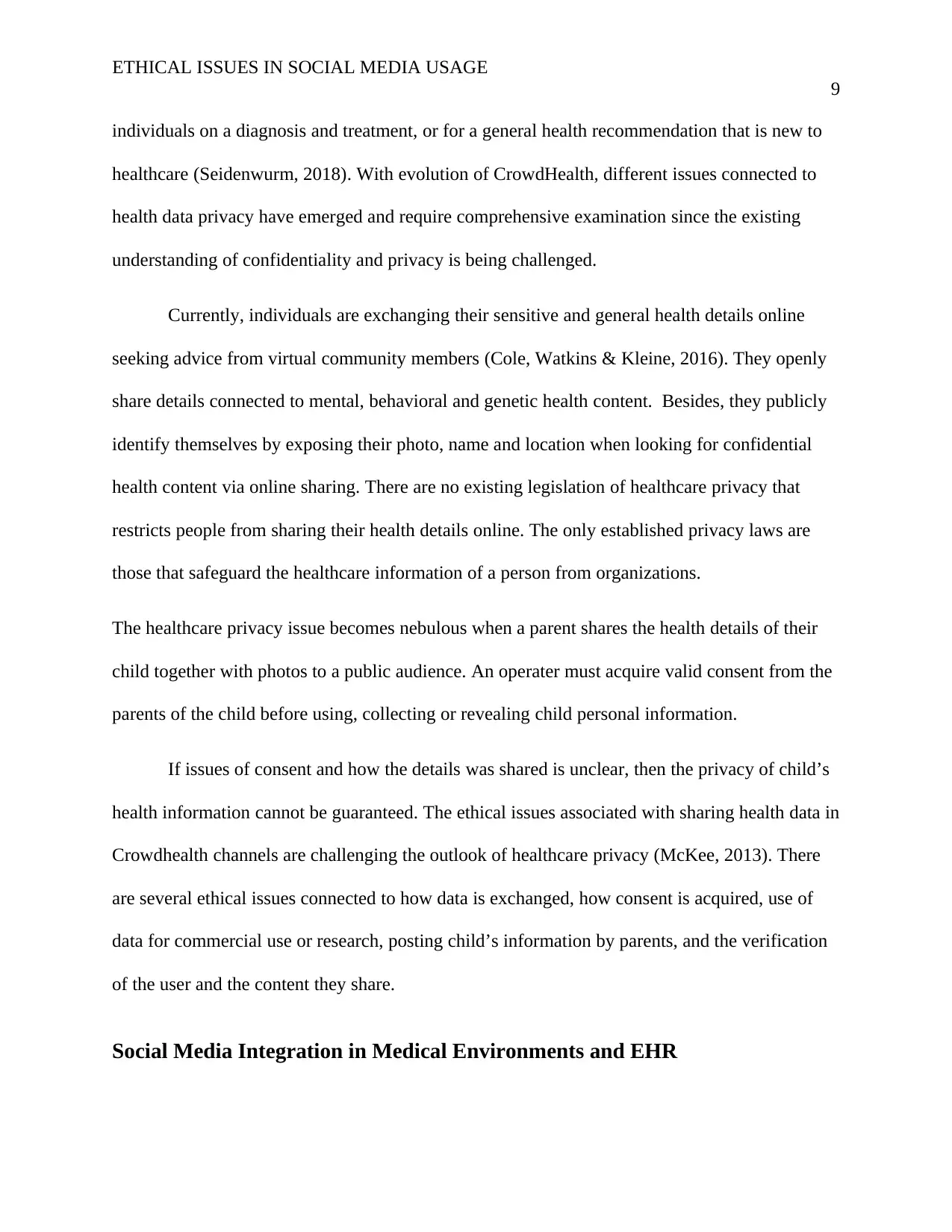
ETHICAL ISSUES IN SOCIAL MEDIA USAGE
9
individuals on a diagnosis and treatment, or for a general health recommendation that is new to
healthcare (Seidenwurm, 2018). With evolution of CrowdHealth, different issues connected to
health data privacy have emerged and require comprehensive examination since the existing
understanding of confidentiality and privacy is being challenged.
Currently, individuals are exchanging their sensitive and general health details online
seeking advice from virtual community members (Cole, Watkins & Kleine, 2016). They openly
share details connected to mental, behavioral and genetic health content. Besides, they publicly
identify themselves by exposing their photo, name and location when looking for confidential
health content via online sharing. There are no existing legislation of healthcare privacy that
restricts people from sharing their health details online. The only established privacy laws are
those that safeguard the healthcare information of a person from organizations.
The healthcare privacy issue becomes nebulous when a parent shares the health details of their
child together with photos to a public audience. An operater must acquire valid consent from the
parents of the child before using, collecting or revealing child personal information.
If issues of consent and how the details was shared is unclear, then the privacy of child’s
health information cannot be guaranteed. The ethical issues associated with sharing health data in
Crowdhealth channels are challenging the outlook of healthcare privacy (McKee, 2013). There
are several ethical issues connected to how data is exchanged, how consent is acquired, use of
data for commercial use or research, posting child’s information by parents, and the verification
of the user and the content they share.
Social Media Integration in Medical Environments and EHR
9
individuals on a diagnosis and treatment, or for a general health recommendation that is new to
healthcare (Seidenwurm, 2018). With evolution of CrowdHealth, different issues connected to
health data privacy have emerged and require comprehensive examination since the existing
understanding of confidentiality and privacy is being challenged.
Currently, individuals are exchanging their sensitive and general health details online
seeking advice from virtual community members (Cole, Watkins & Kleine, 2016). They openly
share details connected to mental, behavioral and genetic health content. Besides, they publicly
identify themselves by exposing their photo, name and location when looking for confidential
health content via online sharing. There are no existing legislation of healthcare privacy that
restricts people from sharing their health details online. The only established privacy laws are
those that safeguard the healthcare information of a person from organizations.
The healthcare privacy issue becomes nebulous when a parent shares the health details of their
child together with photos to a public audience. An operater must acquire valid consent from the
parents of the child before using, collecting or revealing child personal information.
If issues of consent and how the details was shared is unclear, then the privacy of child’s
health information cannot be guaranteed. The ethical issues associated with sharing health data in
Crowdhealth channels are challenging the outlook of healthcare privacy (McKee, 2013). There
are several ethical issues connected to how data is exchanged, how consent is acquired, use of
data for commercial use or research, posting child’s information by parents, and the verification
of the user and the content they share.
Social Media Integration in Medical Environments and EHR
⊘ This is a preview!⊘
Do you want full access?
Subscribe today to unlock all pages.

Trusted by 1+ million students worldwide
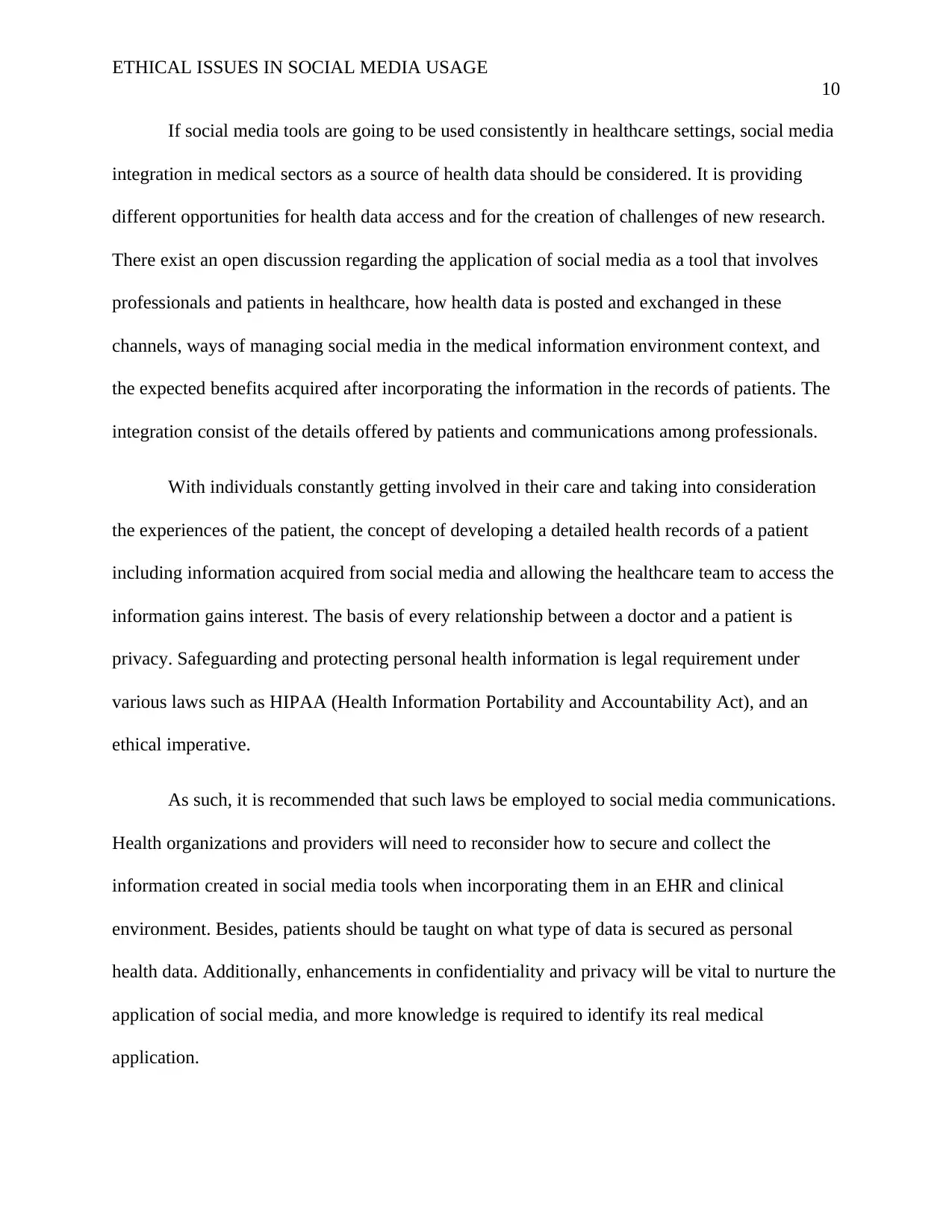
ETHICAL ISSUES IN SOCIAL MEDIA USAGE
10
If social media tools are going to be used consistently in healthcare settings, social media
integration in medical sectors as a source of health data should be considered. It is providing
different opportunities for health data access and for the creation of challenges of new research.
There exist an open discussion regarding the application of social media as a tool that involves
professionals and patients in healthcare, how health data is posted and exchanged in these
channels, ways of managing social media in the medical information environment context, and
the expected benefits acquired after incorporating the information in the records of patients. The
integration consist of the details offered by patients and communications among professionals.
With individuals constantly getting involved in their care and taking into consideration
the experiences of the patient, the concept of developing a detailed health records of a patient
including information acquired from social media and allowing the healthcare team to access the
information gains interest. The basis of every relationship between a doctor and a patient is
privacy. Safeguarding and protecting personal health information is legal requirement under
various laws such as HIPAA (Health Information Portability and Accountability Act), and an
ethical imperative.
As such, it is recommended that such laws be employed to social media communications.
Health organizations and providers will need to reconsider how to secure and collect the
information created in social media tools when incorporating them in an EHR and clinical
environment. Besides, patients should be taught on what type of data is secured as personal
health data. Additionally, enhancements in confidentiality and privacy will be vital to nurture the
application of social media, and more knowledge is required to identify its real medical
application.
10
If social media tools are going to be used consistently in healthcare settings, social media
integration in medical sectors as a source of health data should be considered. It is providing
different opportunities for health data access and for the creation of challenges of new research.
There exist an open discussion regarding the application of social media as a tool that involves
professionals and patients in healthcare, how health data is posted and exchanged in these
channels, ways of managing social media in the medical information environment context, and
the expected benefits acquired after incorporating the information in the records of patients. The
integration consist of the details offered by patients and communications among professionals.
With individuals constantly getting involved in their care and taking into consideration
the experiences of the patient, the concept of developing a detailed health records of a patient
including information acquired from social media and allowing the healthcare team to access the
information gains interest. The basis of every relationship between a doctor and a patient is
privacy. Safeguarding and protecting personal health information is legal requirement under
various laws such as HIPAA (Health Information Portability and Accountability Act), and an
ethical imperative.
As such, it is recommended that such laws be employed to social media communications.
Health organizations and providers will need to reconsider how to secure and collect the
information created in social media tools when incorporating them in an EHR and clinical
environment. Besides, patients should be taught on what type of data is secured as personal
health data. Additionally, enhancements in confidentiality and privacy will be vital to nurture the
application of social media, and more knowledge is required to identify its real medical
application.
Paraphrase This Document
Need a fresh take? Get an instant paraphrase of this document with our AI Paraphraser
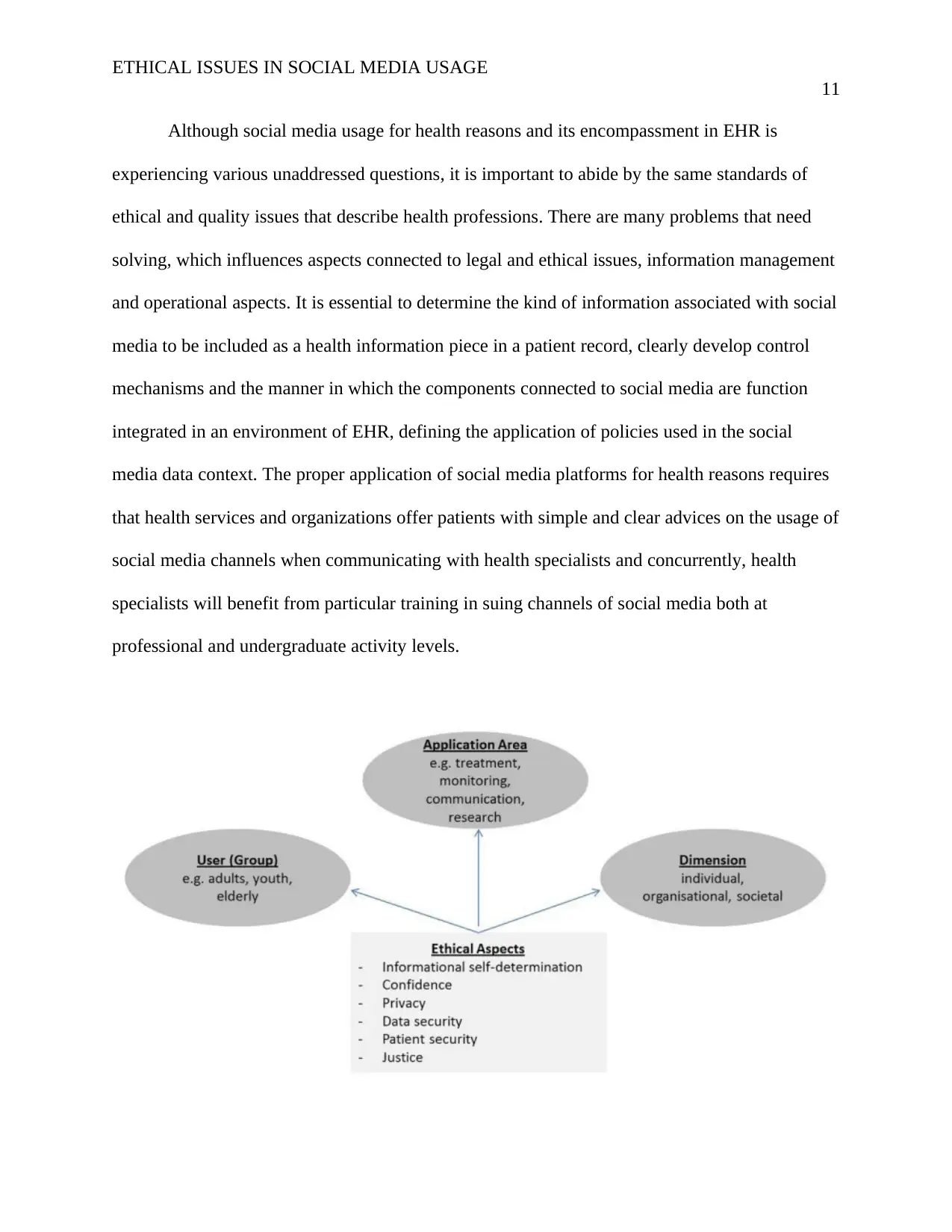
ETHICAL ISSUES IN SOCIAL MEDIA USAGE
11
Although social media usage for health reasons and its encompassment in EHR is
experiencing various unaddressed questions, it is important to abide by the same standards of
ethical and quality issues that describe health professions. There are many problems that need
solving, which influences aspects connected to legal and ethical issues, information management
and operational aspects. It is essential to determine the kind of information associated with social
media to be included as a health information piece in a patient record, clearly develop control
mechanisms and the manner in which the components connected to social media are function
integrated in an environment of EHR, defining the application of policies used in the social
media data context. The proper application of social media platforms for health reasons requires
that health services and organizations offer patients with simple and clear advices on the usage of
social media channels when communicating with health specialists and concurrently, health
specialists will benefit from particular training in suing channels of social media both at
professional and undergraduate activity levels.
11
Although social media usage for health reasons and its encompassment in EHR is
experiencing various unaddressed questions, it is important to abide by the same standards of
ethical and quality issues that describe health professions. There are many problems that need
solving, which influences aspects connected to legal and ethical issues, information management
and operational aspects. It is essential to determine the kind of information associated with social
media to be included as a health information piece in a patient record, clearly develop control
mechanisms and the manner in which the components connected to social media are function
integrated in an environment of EHR, defining the application of policies used in the social
media data context. The proper application of social media platforms for health reasons requires
that health services and organizations offer patients with simple and clear advices on the usage of
social media channels when communicating with health specialists and concurrently, health
specialists will benefit from particular training in suing channels of social media both at
professional and undergraduate activity levels.
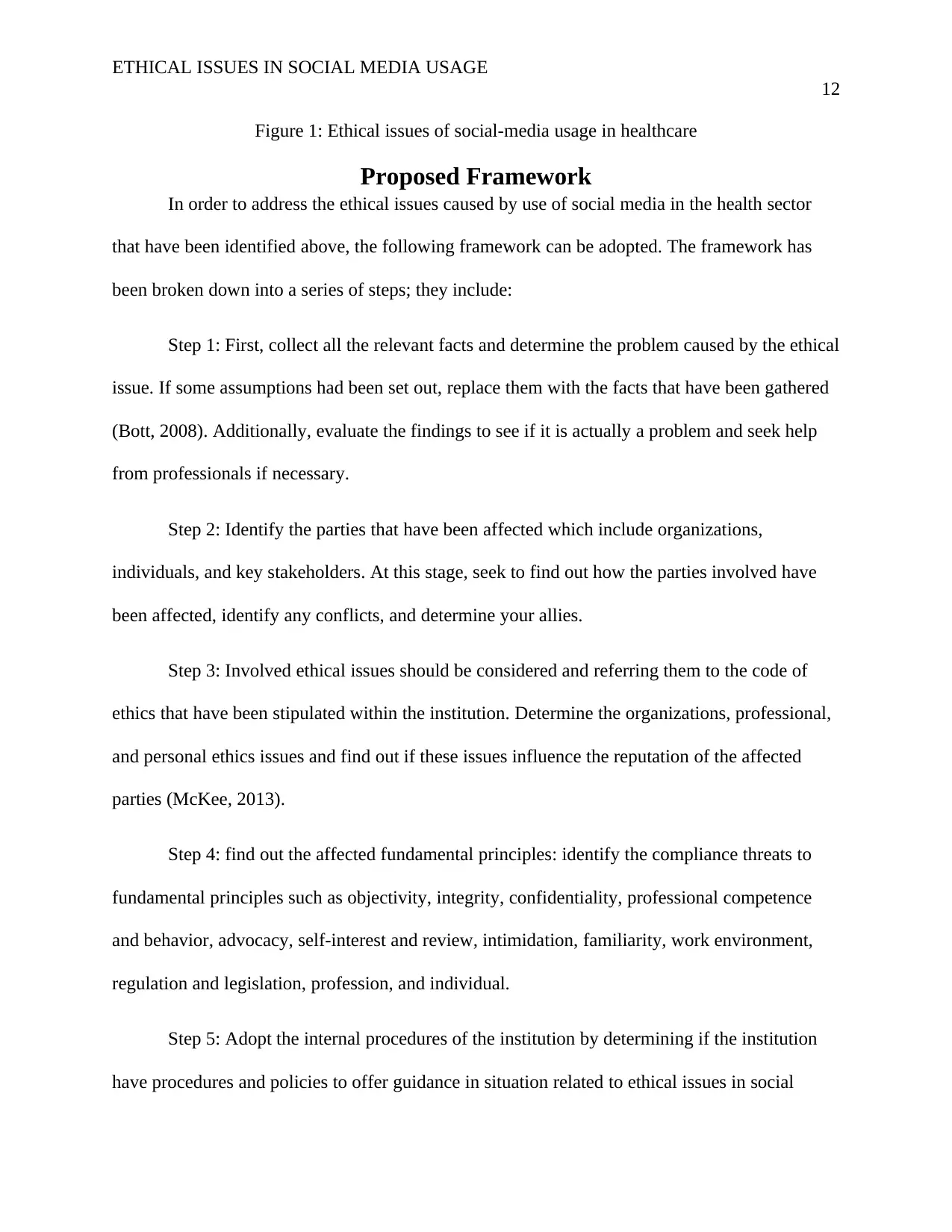
ETHICAL ISSUES IN SOCIAL MEDIA USAGE
12
Figure 1: Ethical issues of social-media usage in healthcare
Proposed Framework
In order to address the ethical issues caused by use of social media in the health sector
that have been identified above, the following framework can be adopted. The framework has
been broken down into a series of steps; they include:
Step 1: First, collect all the relevant facts and determine the problem caused by the ethical
issue. If some assumptions had been set out, replace them with the facts that have been gathered
(Bott, 2008). Additionally, evaluate the findings to see if it is actually a problem and seek help
from professionals if necessary.
Step 2: Identify the parties that have been affected which include organizations,
individuals, and key stakeholders. At this stage, seek to find out how the parties involved have
been affected, identify any conflicts, and determine your allies.
Step 3: Involved ethical issues should be considered and referring them to the code of
ethics that have been stipulated within the institution. Determine the organizations, professional,
and personal ethics issues and find out if these issues influence the reputation of the affected
parties (McKee, 2013).
Step 4: find out the affected fundamental principles: identify the compliance threats to
fundamental principles such as objectivity, integrity, confidentiality, professional competence
and behavior, advocacy, self-interest and review, intimidation, familiarity, work environment,
regulation and legislation, profession, and individual.
Step 5: Adopt the internal procedures of the institution by determining if the institution
have procedures and policies to offer guidance in situation related to ethical issues in social
12
Figure 1: Ethical issues of social-media usage in healthcare
Proposed Framework
In order to address the ethical issues caused by use of social media in the health sector
that have been identified above, the following framework can be adopted. The framework has
been broken down into a series of steps; they include:
Step 1: First, collect all the relevant facts and determine the problem caused by the ethical
issue. If some assumptions had been set out, replace them with the facts that have been gathered
(Bott, 2008). Additionally, evaluate the findings to see if it is actually a problem and seek help
from professionals if necessary.
Step 2: Identify the parties that have been affected which include organizations,
individuals, and key stakeholders. At this stage, seek to find out how the parties involved have
been affected, identify any conflicts, and determine your allies.
Step 3: Involved ethical issues should be considered and referring them to the code of
ethics that have been stipulated within the institution. Determine the organizations, professional,
and personal ethics issues and find out if these issues influence the reputation of the affected
parties (McKee, 2013).
Step 4: find out the affected fundamental principles: identify the compliance threats to
fundamental principles such as objectivity, integrity, confidentiality, professional competence
and behavior, advocacy, self-interest and review, intimidation, familiarity, work environment,
regulation and legislation, profession, and individual.
Step 5: Adopt the internal procedures of the institution by determining if the institution
have procedures and policies to offer guidance in situation related to ethical issues in social
⊘ This is a preview!⊘
Do you want full access?
Subscribe today to unlock all pages.

Trusted by 1+ million students worldwide
1 out of 20
Related Documents
Your All-in-One AI-Powered Toolkit for Academic Success.
+13062052269
info@desklib.com
Available 24*7 on WhatsApp / Email
![[object Object]](/_next/static/media/star-bottom.7253800d.svg)
Unlock your academic potential
Copyright © 2020–2026 A2Z Services. All Rights Reserved. Developed and managed by ZUCOL.




